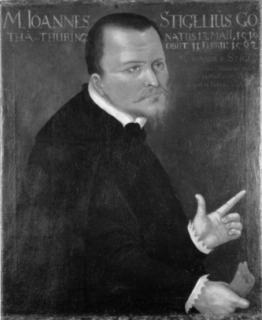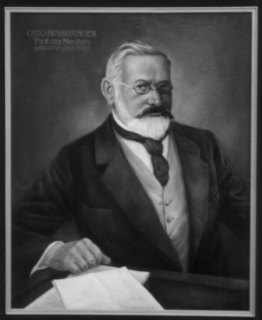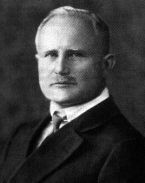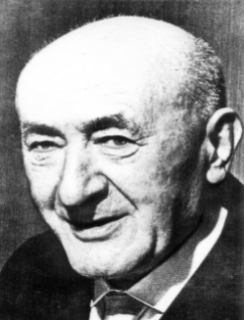
Johannes Stigel
Image: FSU JenaWhat Ebbinghaus once said about psychology in general can be said about psychology in Jena: 'It has a long past but only a short history.' As far back as the 16th century, the first university professors Johannes Stigel (1515-1562) and Victorius Strigel (1524-1569) gave lectures about psychological questions in the spirit of Melanchton.
In 1728 Gottlieb Stolle (1673-1744), a professor of politics, started to give lectures that claimed to highlight psychological problems. Devoted to the spirit of Pre-Enlightenment, Stolle wanted to pass on to his audience a knowledge of human nature and skills how to judge people that were based on a contemporary empirical science of the mind and a psychology of abilities.
In the 19th century, when Jena became a centre of classical German idealism, psychological thinking was primarily dominated by philosophical systems. Whereas Jacob Friedrich Fries (1773-1843) tried to put Kant's philosophical system on a general psychological base, Carl Fortlage (1806-1881) endeavoured - with reference to Fichte's philosophy - to create a 'system of psychology (...) from the observation of the inner sense'.
Otto Binswanger
Image: FSU JenaEfforts to pursue the study of psychology as an empirical science were pursued especially by the members of the medical faculty in Jena. The physiologist William Thierry Preyer (1841-1897), inspired by Fechner's Psychophysics as well as Darwin's theory of evolution, became a pioneer of scientific child psychology in Germany when he wrote his monography about Die Seele des Kindes (1882) which was based on methodically sound observations. The psychiatrist Otto Binswanger (1852-1929) carried out experimental studies about hypnosis and emphasized the relevance of psychosomatic connections in the field of practical medical work. Theodor Ziehen (1862-1950), also a psychiatrist (in Jena 1887-1900), is one part of the classical trio of sensualistic association psychologists (together with H. Ebbinghaus and G.E. Müller) and with his Leitfaden der Physiologischen Psychologie created a counter-concept to Wundt's theory of the same name.
Hans Berger
Image: FSU JenaBinswanger's successor as clinical director, Hans Berger (1873-1941), was - although a psychiatrist - also important for the development of psychology as an empirical science. He succeeded in being the first to chart electric potential variations in the human brain in 1924. After a careful review of his conclusions he published an article about the Elektrenkephalo-gramm - today known as Electroencephalography (EEG) - in 1929, a scientific achievement that has not lost its importance in present-day science.
Wilhelm Peters
Image: FSU JenaIt was not until the early twenties that initiatives arose to found a place to perform independent psychological training and research. They had their origins in the Thuringian teacher's union, the Carl Zeiss company and the Society for Experimental Psychology. At last in 1923 the Psychologische Anstalt was founded. Wilhelm Peters (1880-1963), a former student of Wundt, was appointed director against the resistance of the philosophical faculty. With his work in the field of educational and developmental psychology, especially the nature-nurture problem, he and his co-workers contributed to the scientific high standing of the the institute. When the fascists took over power in 1933 he was dismissed as university professor because of his Jewish ancestry. Director of the institute became Friedrich Sander (1880-1971). who was also a disciple of Wilhelm Wundt. As an advocate of Ganzheit psychology, he fully met the expectations the Nazis had of what a German university professor should be. The building of the insitute was destroyed during air raids in 1945.
After the reopening of the University of Jena in October 1945, the psychology department was faced with major deficits in personnel and equipment. Primarily involved with teacher's training, the Institute of Psychology, which had since lost its independence in the, was refounded in 1960 under Friedhart Klix (born 1927), and starting in 1961 it was possible for students to complete their studies in psychology with a degree. When Hans Hiebsch (1922-1990) was offered a chair as professor, the institute became a centre of social psychology in the German Democratic Republic. Hiebsch tried to develop a concept of social psychology that was based theoretically and philosophically on dialectic and historical materialism, while at the same time being integrated in the international development of the subject.
After reunification (1989/1990) a process of reconstruction and reorganization began with the purpose to establish psychology with its whole range of teaching, research and application. Integration in international projects was a major goal. The concept of psychology in Jena is 'biopsychosocial', an interdisciplinary approach to biology and the social sciences. For years now there have been extensive projects in progress, for example on neuro- and cognitive science, on relationships between social groups and the consequences for those involved, on development of personality over a life span, and on important fields of applied psychology like health and work.
In 1999 a European Graduate College, 'Conflict and Cooperation between Social Groups', was created as a collaboration of research groups at the University of Jena, the University of Kent at Canterbury (United Kingdom) and the University of Louvain-la-Neuve (Belgium). The DFG Research Unit "Discrimination and Tolerance in Intergroup Relations" was established from 2002 until 2010 and the DFG-Research Unit "Person Perception" is established since 2009.



